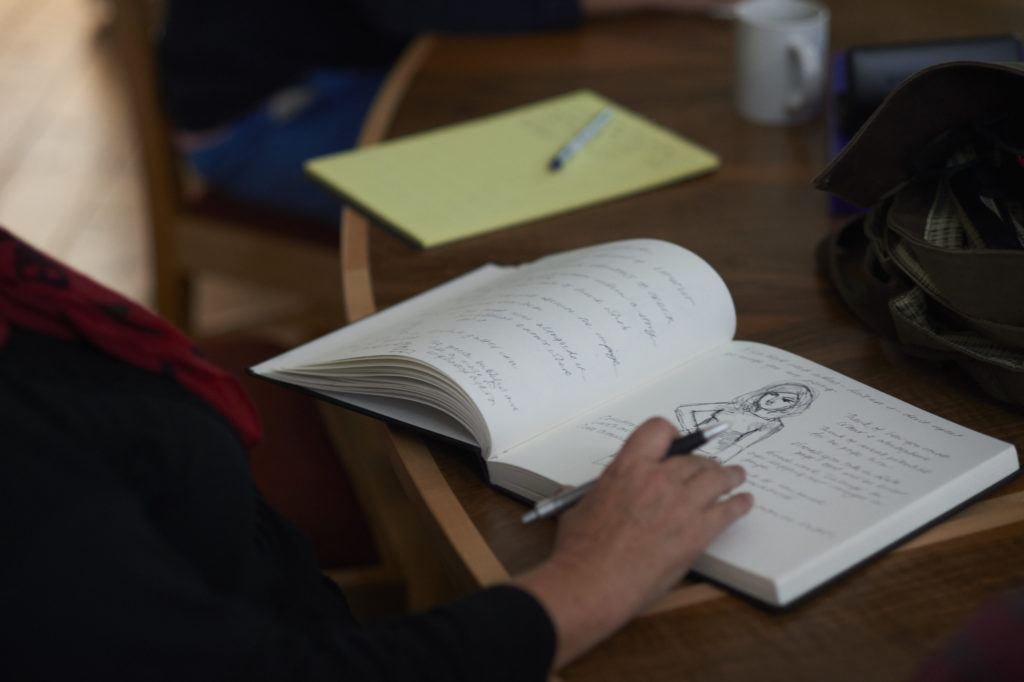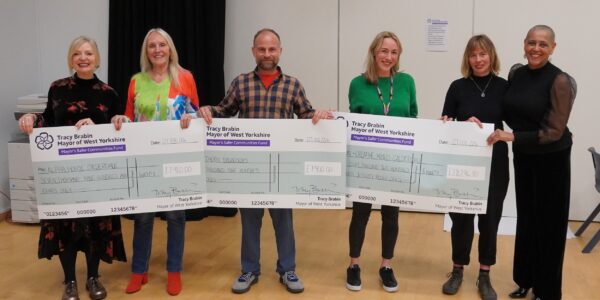The conundrum that the notebook solves
24 Oct 2014 / General

Gabriela Blandy, Assistant Centre Director at The Hurst, on keeping a notebook
If there is a knock at the door you will ignore it because you are not expecting anyone. A cup of tea steams on the desk beside you. Your computer hums. A whole morning for writing has been set aside; a new document waiting to be christened with a sentence.
The only trouble is that your mind is blank.
After a while, you begin to hope for a knock at the door.
Perhaps you should switch your phone back on…
You clear your throat and write: Rita walked up the stairs. But then you think: what if she doesn’t?
You sign and take a sip of tea, imagining what would happen if Rita walked up the stairs and then what would happen if she didn’t. Then you wonder if you even like Rita. Why have you made her the main character in your story?
And all of a sudden, the morning is over. It’s time to get back to life, the real world, only you’ll have to do so with a nagging sense of failure because your novel still sits at that unimpressive nine thousand six hundred words. A sickly feeling will fester in your belly and make the next ‘writing session’ even harder – as if that could be possible.
Why do we do it; this writing business?
The answer is different for everyone, and can change day to day, moment to moment. There are times when you just don’t know why you write, but are convinced that if you were to stop, so would the world and its meaning.
This is the conundrum that the notebook solves: the need to write versus the inability to write.
It isn’t enough to feel creative – to be aware of an imaginative passion in your veins – because like any form of energy it begs to be used. But if you don’t know where it is, or what it is, how do you start?
Today’s world is instantaneous. We are hungry therefore we go to the cupboard and grab something to eat. This is a good writing day, where impulse and ability have both turned up hand in hand. Instant gratification is wonderful, so easy, so delicious. We love it so much that a shift begins to occur – it is not the hunger we are responding to anymore, but the desire for immediate bliss: the end product. We are no longer thinking about our longing to write, we simply want to have written – a poem, a novel, a short story. We want it, and we want it now.
Let’s take the finished product of writing as an athletic performance at the Olympics. You wouldn’t expect to pick up a javelin for the first time and launch it to gold right away. The fact is, the Olympics happen every four years and you spend that time earning your right to be there.
The notebook is your training.
You hear about athletes finding their form, having bad days. Writing is much easier than training to throw a javelin because you don’t even have to get out of bed to do it. You can reach over to your bedside table, grab your notebook, scribble for ten minutes, and feel proud that you have taken another step towards gold.
The notebook is a free zone – it is training, remember. Here you work things out. You don’t need to know whether Rita goes up or down the stairs. You can write for your ten minutes one morning, saying: okay, today Rita goes up. The following day, see what happens when she goes down. Only then do you realise that Rita isn’t in fact anywhere near a staircase, she is in the town square about to jump into the fountain.
The notebook is where you stretch, flex your muscles – develop your muscles. You have a look around, see what’s there.
Nothing.
Okay, fine – just keep going for ten minutes then stop and try again tomorrow.
Still nothing!
Fine, but ten minutes, all right, and then you can stop, try again in the morning.
NOTHING, NOTHING, NOTHING!
No problem. But don’t give up.
Wait…I think there’s something…
That’s why to write a notebook is to not give up. Actually write – put words down. In that simple act, you say: I am at it, in training, earning my right to go for gold.
I have dozens of notebooks. On the desk beside me is one from four years ago that I pulled off the shelf.
‘I saw girls, making small square cakes at the market. They were doing the icing – cutting out coloured strips that they would use to make bows so that the cakes looked like miniature presents. Baby blue and pink. The girls had young faces. One of them had floaty blond hair. She had a face that reminded me of those child beauty queens where the make-up looks sweet, and sad.’
I remember when I saw these girls, and though I don’t recall writing this paragraph, I know how I would have felt when I did: that I couldn’t find the words to match the way I was feeling. This is often the way it is when I write an idea for the first time. Reading it now, I see I have managed to get down enough to work with. That’s all a notebook asks for – enough. It doesn’t demand perfection, simply an attempt at getting it down so that you can satisfy the creative urge without having to worry about whether it’s any good. The athlete in training, who perhaps has a stitch in their stomach, which is making them feel sick, knows that giving up is not an option – not if they want that gold medal. Writing is the same. If you want that poem, that novel that short story, you have to keep going. It’s the only way. Anything else is just distraction.
A notebook builds your stamina. Make a decision to sit down and write for ten minutes, no matter how you feel. Write about the girls you saw making cakes, and even though you have that discomfort when none of the words are the right ones, keep going. It’s the only way.
‘If you offered him salad, Ian would rub the shelf of his belly and say: it’s too late for that! Rolling a cigarette, he sits with it cupped in his hand – a child’s hand set against his weathered hulk. He begins to glance at the door and windows, shaking the cigarette in his palm like dice. I’m just going for a breath of fresh air, he says, finally; a great heave up from the table, smiling his exit so that you see into the cave of his mouth.’
This is another entry. I was practising character, seeing what techniques were available to me: comparisons, exaggerations. I wasn’t specifically working on a story about Ian, or trying to get anywhere, I was just allowing the words to come, seeing what I could do. Sometimes we feel blocked when we write, not because of a dearth of ideas, but simply because we are not writing enough, keeping the creative passages clear. We need to allow the artistic worm to navigate the soils of our mind.
There are some days when a blank page terrifies me – but because of my regular notebook practice I know this means nothing. It’s certainly not a reason to stop. The opposite, in fact. Writing is the best way to move through discomfort. Treat the blank page like a first kiss.
Some entries in my notebooks are lists. Those are the days when I can’t even bear to write a sentence, but I still have ideas and images in my mind. I am like a cow with aching udders who cannot face entering the milking shed – even though I know I will feel better afterwards. The notebook calls. It says: I know this is hard, but that’s what makes it so good.
Just ten minutes, it says. You don’t even have to use punctuation. You can just write words. They don’t even have to make sense.
Later, when I look at those words, those lists, I think: hang on, there’s a poem here! And up it goes on my blog in celebration.
During the week, when I’m juggling work, training my dog, trying to make sure there’s food in the fridge and the house isn’t a mess, I maintain a writing practice with very little expectation. It’s only training, I remind myself. I will sit and write for ten minutes in my notebook – sometimes I use a picture as inspiration, or perhaps a title from a poem; it might be just one word. The trick is to keep writing: there are plenty of other moments in the day for staring out of the window!
It may be that as soon as the ten minutes is up, I throw down my pen and feel utterly revolting. But I can’t deny that there is also a tiny part, beneath all that, which can think: at least I did it; at least I proved that I am still at it.
Sometimes though, ten minutes turns to twenty, maybe even an hour.
At the weekend, or on my day off, I try to be a little bit more serious about the writing. I actually turn my laptop on, open up my work in progress and prod at the keys. My stamina is fairly good. So is my concentration. Those ten minutes a day have served me well. There are also times when I think: hang on, didn’t I just write a really good description of a park bench this week? I rummage through my notebook and find it, thinking how well it fits right here: my main character is on a lunch break – why not a park? I type the page out, seeing that I have increased my wordcount by five hundred, without even trying, and all because of a tatty notebook
Gabriela blogs about her own writing journey at www.thesenseofajourney.com



